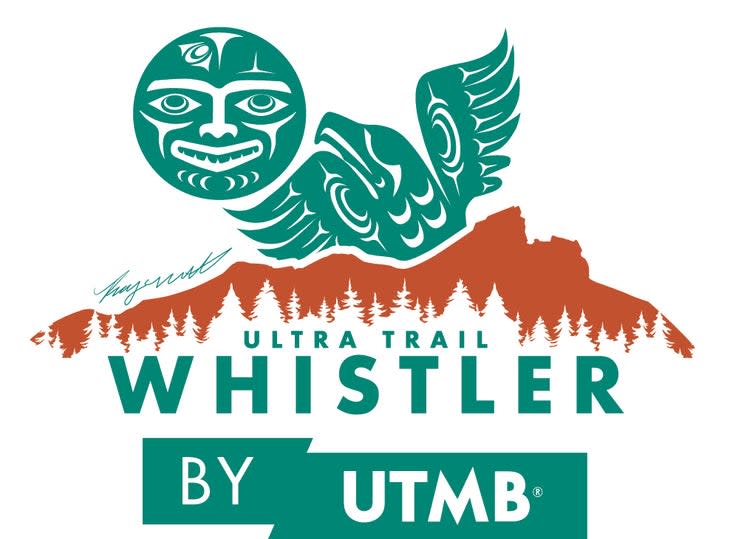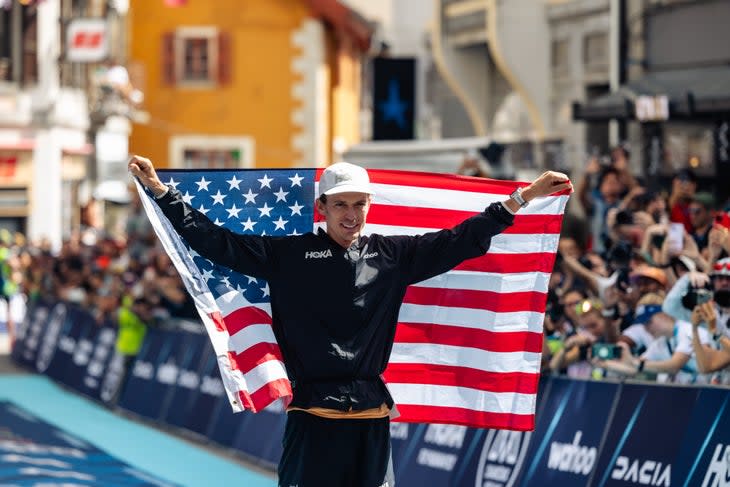New Ultra Trail Whistler by UTMB Exposes Sport’s Growing Pains
This article originally appeared on Trail Runner
With massive growth and interest booming in trail running at both the grassroots and global levels, the sport is clearly at a crossroads.
While there are still thousands of race directors striving to put on events with the local community vibe that's been part of the sport since the 1970s, there are also a few large, well-funded organizations that are expanding international race circuits for the sake of growing participation, building exposure and, of course, financial gain. The growing pains of the sport are often exposed when these two sides and their differing vibes collide.
This collision was felt most recently on Thursday, after the communications team for the Ironman-backed UTMB World Series announced plans for its first event in Canada, slated for September 28-29, 2024, at Whistler Blackcomb resort in British Columbia. Called the Ultra Trail Whistler by UTMB, it's the 40th event in the global UTMB World Series circuit, the first in Canada, and it will feature race distances of 25K, 50K, and 100K. It will serve as a qualifying event that feeds into the UTMB World Series Finals races in Chamonix, France.
However, not long after the event was announced, Gary Robbins, a respected longtime trail runner and race organizer of several events in British Columbia, posted an extensive blog post suggesting that Whistler Alpine Meadows (WAM) trail running events, which were held at Whistler from 2016 to 2022 by his organization Coast Mountain Trail Running (CMTR), had been systematically pushed out by Vail Resorts-owned Whistler Blackcomb.
Robbins said Vail Resorts' poor communication and new safety and logistical requirements led to the demise of the WAM events, and he inferred these issues and new policies likely stemmed from an orchestrated collusion between the Ironman-UTMB organization and Vail Resorts to supplant his race with a new UTMB World Series event.
"My personal take, in the end, was that we were very obviously being forced out," he wrote. "By going about it in this manner no one ever had to take responsibility for saying no to our event, and, to their credit, they never did say no to us, they simply pushed us out by other means."
Robbins did not immediately respond to Trail Runner’s interview request.

(Photo: Courtesy of UTMB)
Two Sides to Every Story
Ironman-UTMB officials who developed the new event said Friday they were surprised at Robbins's reaction because he and his event partner Geoff Langford had voluntarily chosen to cancel its proposed September 2023 event during the application process back in February, saying on February 10 that CMTR would not pursue any further events in Whistler and, after six successful editions, there was "no path forward for us to produce races of this magnitude."
Keats McGonigal, Ironman's North American vice president of operations, is overseeing the new Whistler event and said the Ironman-UTMB organization had been interested in a Canadian event since the inception of the UTMB World Series two years ago, but it didn't zero in on Whistler until late last winter after CMTR opted out.
"It was our understanding, based on Gary’s public comments, that he was exiting the Whistler market and had no intention of ever going back," McGonigal said. "That was our understanding based on what he had put out publicly back in February. So we were taken a little bit aback because it’s like, 'Hey, you guys said that you were out of there and you weren’t going back. So if you’re going to leave a market, then you’re going to leave a market."
After Robbins posted his version of the events on his blog, the topic turned into a firestorm on social media. Most of the commentary was in favor of Robbins and CMTR events as many trail runners were quick to pile on and bash the Ironman-UTMB organization. That included 2023 Ultra-Trail du Mont-Blanc winner Jim Walmsley, asking: "So what do we race next year then?" on Strava, and a critical post from North Vancouver resident Ellie Greenwood, a two-time 100K world champion and 2012 Western States 100 winner who won the WAM 25K in 2017. She accused Whistler Blackcomb resort officials of making the permitting process impossible for WAM to continue, and she encouraged runners to consider local races instead of those in the UTMB system.
RELATED: 10 Things to Know About Jim Walmsley’s Obsession with UTMB
"Swoop in with your big bucks and corporate ways to piggyback off the work of a locally independent company," Greenwood wrote. "I get it, UTMB in Chamonix looks cool and you need to get ‘stones’ from one of their races to enter. But please consider if you really want to run UTMB so much that you condone this sort of behavior."

Communication Breakdown
Robbins said shortly after the WAM events in 2022--which he said were a big success--the resort gave up its traditional race weekend dates to an "Everesting" vertical challenge event it produced with a partner (an event known as 29029 Whistler), thus forcing CMTR to settle on another weekend for WAM in 2023. But then they began experiencing fragmented communication with the resort and new safety requirements that delayed their ability to announce new dates and open registration, ultimately forcing them to permanently cancel the event.
In a statement issued by a Whistler Blackcomb spokesperson on Friday, the resort said it admitted to--and apologized for--poor communication with Robbins and Langford. It said it had been willing to work with the race directors to hold WAM in 2023, but said it was the race directors, and not the resort, who decided to cancel the 2023 events last February after they declined to submit a revised plan that would address additional logistical and safety concerns that arose after the 2022 WAM races.
"What this comes down to is we simply were not satisfied or comfortable with how Whistler Alpine Meadows planned to address safety issues from the race the year prior," Whistler Blackcomb's release said. "We will not compromise on safety as it is our number one priority, and we should note that our safety protocols and policies have not changed significantly year over year. We were not willing to move forward with the 2023 race without an adequate safety and medical plan, and WAM was unwilling to work with us on this."
In a meeting between the WAM team and Whistler Blackcomb on February 9, the resort outlined the need for more details specific to safety and medical response capabilities, along with the need to discuss a re-worked course route, before green-lighting the event for this year. If those compromises had been made, the resort said CMTR could have hosted a condensed version of WAM in 2023 with the possibility of bringing it back in full in 2024.
Although CMTR announced it had permanently walked away from the event in its February 10 post on Instagram, Robbins seemed to contradict that in his blog. He wrote that, as recently as last summer, he and Langford were optimistic they would renew a dialogue with the resort for holding the WAM events in 2024 after their previous resort contact had been replaced. He even suggested that, for the past five weeks, the CMTR team had been "holding our collective breath about a hopeful surprise announcement to the community that we'd be returning to Whistler next year!"
But that was never in the cards, as the Ironman-UTMB team had already begun putting together an event plan with the resort earlier in the summer.
RELATED: UTMB, Don’t Break Our Hearts
McGonigal said the Ironman-UTMB organization has had long-standing business relationships with Whistler-Blackcomb, local event organizers, and various other local land and governmental agencies because it organized its Ironman Canada triathlon in Whistler from 2010 to 2019. That event has since moved back to Penticton, British Columbia, but the Ironman-UTMB team was able to reconnect with some of those contacts this past spring as it began pursuing Whistler for an event.
Ironman-UTMB hired Christine Cogger, a longtime Whistler-area trail runner and event director, as its race director for Ultra Trail Whistler by UTMB. Cogger, who has lived in the Whistler area for more than 20 years, has started local events, worked on events at Whistler Blackcomb, and also worked on Ironman Canada.
"I really believe that there is room in the trail space for more opportunities for runners," Cogger said. "Gary puts on great races and I’ve participated in his races, and I have nothing but great things to say. One thing that happens in these races is that races sell out and people don’t have the opportunity to come and race. So why not create more opportunities? And why not give people the opportunity to race, in what is essentially my backyard, to experience some of the trails that we have access to in a really positive way. That’s really how I feel. I really believe that there’s room for everyone."
UTMB Group, a French organization founded around the 2003 inception of the Ultra-Trail du Mont-Blanc race in Chamonix, France, partnered with Ironman in 2021 to develop and grow the UTMB World Series qualifying circuit of races. In addition to the new race in Whistler, the series has also recently added races in China, Brazil, Italy, South Africa, Mauritius, Ecuador, and South Korea. Its newest U.S. race additions-- Kodiak Ultramarathons in Big Bear Lake, California, and the Grindstone Trail Running Festival in Mount Solon, Virginia--were held in mid-October and late September, respectively.

Can Growth Benefit Everyone?
There is a history between CMTR and the Ironman-UTMB organization. Both sides acknowledge that the Ironman-UTMB organization reached out to Robbins and Langford in 2021 to open a discussion about acquiring one or more of its races, but Robbins and Langford said they weren't interested and declined to meet. After the Whistler Alpine Meadows event was held in September 2022, Ironman-UTMB reached out again and Robbins and Langford agreed to take the video call. What was discussed in that meeting remains confidential because it was organized under a non-disclosure agreement.
Robbins reports that he told Ironman-UTMB officials the non-negotiable items that he would want to see continued, including community support programs, volunteer appreciation programs, and other touchpoints with the local community. He says he was told that those items would be conversations for another time, but that was the last time the two groups interacted.
"Geoff and I have been doing this now for 11 years now, and the first five were a major struggle to make ends meet. Given the unique opportunity on the table, we decided, after an incredible amount of dialogue between us and our families, that we might as well hear them out," Robbins wrote. "We signed an NDA and had a single Zoom meeting with them. I was completely torn about this and cannot say with any certainty what we would have done had we been tabled an offer. Above all else we would never compromise what we'd built by allowing a major entity to not honour [sic] our values."

At the same time, Robbins said he and Langford were having difficulty with the resort about getting permits for its proposed 2023 events. (He said the point person had been "ghosting" them and not responding to their communications.) They eventually went over the head of their contact person at the resort and, after talking with senior management officials, said that the resort came back to them with a new event approval process with many new requirements that Robbins says included "a steep new operating fee, technical and safety requirements completely unrelated to a trail running event, and a host of other items that'd never been there before."
"All in all though, we felt it was still manageable to work through, and we wanted to continue," Robbins wrote. "We simply asked if they could trust in how we had delivered in the past, and if we could agree to go through the process, and eventually get there, but that we'd need to open registration immediately, as we were already pushing into February by this point. The response was that we would not be allowed to promote our race, nor sell any entries until the event was entirely approved by Vail."
Robbins concluded his blog post by saying CMTR would now be launching a new race in British Columbia that would go head-to-head in direct competition with the new UTMB World Series event in September 2024.
RELATED: What Strava Data Tells Us About how Runners Train for UTMB
Paul Huddle, Ironman's senior director for global trail running operations, is aware that Ironman is seen as "the big bad wolf" because it's a corporate entity with a global agenda. He understands why local pride is so prominent in the sport and relates to both how smaller races play an important role in the international growth of triathlon, and how surfers claim ownership of their local beach breaks and rebuke tourists when they drop in to experience the same waves.
"There’s room in the market for grassroots events which we all love, but I also love going to Chamonix. I mean, it’s a crazy fantastic experience and I think we want to create some of those opportunities in North America," Huddle said. "Does that mean the other small races go away? Absolutely not. We’re all stewards of this amazing sport, and we need to band together more than go apart. But again, I get it. Ironman, UTMB, we’re the big bad wolf ... we’re the corporate whatever. I understand that and I empathize with that. But I do think there’s an opportunity here for both."
McGonigal also said Ironman-UTMB specifically took into consideration the dates of other events in British Columbia--including the August 17-18 Squamish 50 put on by CMTR--so as to not directly compete with it. The Ironman-UTMB organization has offered to meet with Robbins, Langford, and the CMTR next week to clear the air about the possibility of helping promote the CMTR's Squamish 50 races.
"With all of this, we wish Gary the best and hope that his Squamish 50 continues to be supported by the local community and that people use that as a training event to get ready for the event in Whistler," McGonigal said. "We know and recognize that we want the local trail running events to be successful. That is something that we wholeheartedly support. We want the local running community to have very good, well-produced, successful events, because that’s ultimately what’s going to raise the level of the sport. We hope Coast Mountain trail events are super successful. If he can bring more people into the sport, that’s what helps all of us."
Editor's note: Trail Runner will continue to update this story as more sources become available for interviews. Outside Inc. has a streaming agreement with Ironman/UTMB, however its media platforms maintain complete editorial freedom over the content it publishes.
For exclusive access to all of our fitness, gear, adventure, and travel stories, plus discounts on trips, events, and gear, sign up for Outside+ today.

